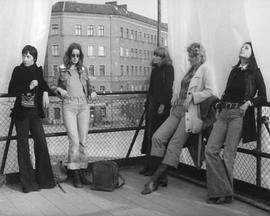全面退化的人格-電影介紹
Most women work harder than men. They do the things they want to do when they have already spent sixty hours working on something else. Edda is tough, like so many others. These are the words of Helke Sander, who both directed and played the leading role in her first fiction feature, which reveals three days in the life of a woman and photographer - and three days in the life of West Berlin in March 1977.
Edda works as a freelance press photographer, usually on commission earning little for uninteresting jobs: taking pictures of cocktail parties, meetings, and reunions. She struggles to maintain her commitment to herself as a woman, artist and single mother, and to support herself and her daughter financially and spiritually. She joins a small team of photographers who have been commissioned to take pictures of West Berlin. The women approach the wholeness of the divided city with a critical eye, much to the chagrin of the men who meant to exploit feminism for profit while promoting West Berlin to attract business investors.
Sander's film is a brilliant yet subtle meditation on representation - how to visually and aurally depict both women in their personal and professional lives, and Berlin in its dialectical process of being a city; the film questions the construction of identities of both women and the city in conflict with common perceptions about them.
Her film proved a great success at the International Young Film Forum in Berlin in 1978 and is anything but a tearful lament on the situation of a woman who pays for her independence by restricting her other needs in life, her political and private interests and plans, to an absolute minimum. Helke Sander presents the everyday life of her stressed heroine with a great deal of irony and sympathy and just as much remoteness.
Because Edda's life is representative of that of most modern women, she is a figure with whom the viewer could identify if the director did not always carefully undermine any tendency towards illusionism, be it through her comments, her citations from films and literature, by inserting newspaper excerpts and radio broadcasts and above all through the pictures of Berlin, the Wall, the refuse, the piles of rubble and the graffiti.
This women's film is simultaneously about Berlin, a city that is torn asunder in the same way as the heroine's life, a life in installments.
"In bits, yet complete, because everything is complete and if you break it into parts, it will become complete again, each part for itself" - East German author Thomas Brasch who emigrated to the West in 1976. (Annette Meyhoer) Most women work harder than men. They do the things they want to do when they have already spent sixty hours working on something else. Edda is tough, like so many others. These are the words of He...




















全面退化的人格-留言評分